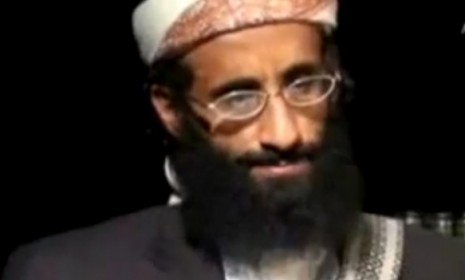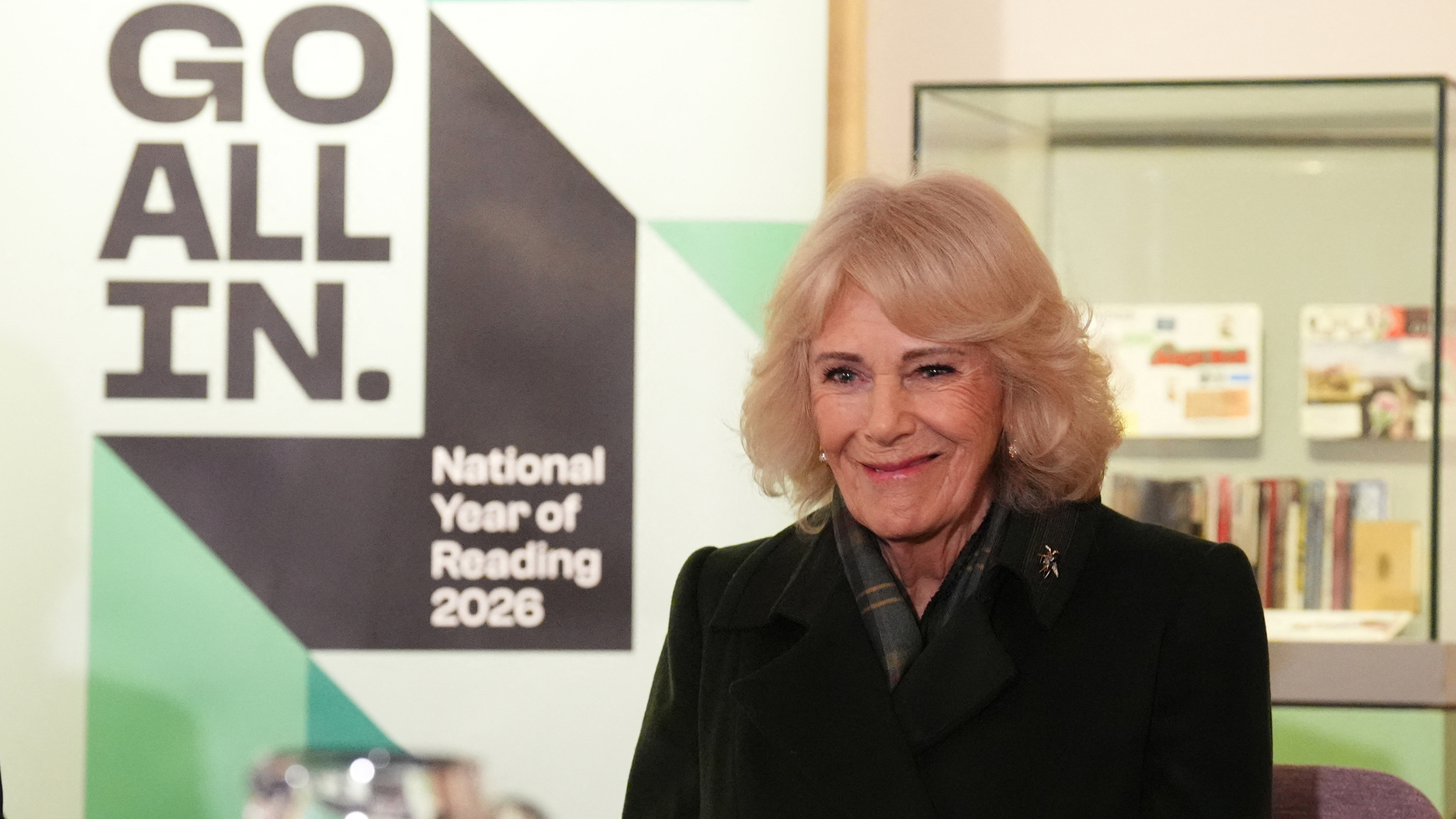Imam in the cross hairs
Civil libertarians want to stop the U.S. from assassinating American Imam Anwar al-Awlaki. Why is he a marked man?

Who is Anwar al-Awlaki?
“Terrorist No. 1 in terms of threat against us,” in the words of Rep. Jane Harman, an intelligence expert. The sermons of the charismatic, Internet-savvy imam have been found in the possession of nearly every Islamist radical who has attacked Western targets in recent years, including the London subway bombers and Zachary Chesser, an American who recently confessed to helping Somali terrorists. Al-Awlaki may even have been involved in the 9/11 attacks (see below). The Obama administration has targeted him for assassination, to the dismay of civil-liberties advocates, who note that he is an American citizen who has never been charged with terrorism crimes. Al-Awlaki’s father and the American Civil Liberties Union have sued the government, arguing it can’t impose a death sentence on a U.S. citizen without trying him first.
Where is he now?
The Week
Escape your echo chamber. Get the facts behind the news, plus analysis from multiple perspectives.

Sign up for The Week's Free Newsletters
From our morning news briefing to a weekly Good News Newsletter, get the best of The Week delivered directly to your inbox.
From our morning news briefing to a weekly Good News Newsletter, get the best of The Week delivered directly to your inbox.
He’s believed to be in southern Yemen, under the protection of al Qaida in the Arabian Peninsula, the network’s Yemeni branch. There, intelligence officials say, al-Awlaki not only preaches that Muslims have a duty to wage war against the West, he actively plots terrorist attacks. Umar Farouk Abdulmutallab, who attempted to bring down an airliner with a bomb hidden in his underpants last Christmas Day, told interrogators that al-Awlaki was one of the al Qaida operatives who trained him. Faisal Shahzad, the would-be Times Square bomber, said that al-Awlaki’s recorded sermons had inspired him. And al-Awlaki exchanged e-mails with Maj. Nidal Hasan, the Army psychiatrist charged with killing 13 military personnel at Fort Hood, and publicly praised the massacre.
How did al-Awlaki become a U.S. citizen?
He was born here. His father, Nasser al-Awlaki, moved his family to the U.S. in 1971 to study at New Mexico State University in Las Cruces, where Anwar was born. The family returned to Yemen in 1978, when Anwar was 7. While in Yemen, he was exposed to Wahhabism, the puritanical strain of Islam practiced by Osama bin Laden, and dreamed of fighting the Soviets in Afghanistan. But instead of waging holy war, he returned to the U.S. in 1990 to attend Colorado State University in Fort Collins. In 1994, he took a part-time job as an imam at the Denver Islamic Society.
Is that when he became a radical?
A free daily email with the biggest news stories of the day – and the best features from TheWeek.com
When that change occurred is unclear. In Denver he preached a brand of Islam friendly to the West, and he later did the same in San Diego, where he moved in 1996. (While in San Diego, he was also placed on probation after two arrests for soliciting prostitutes.) In 2000, al-Awlaki moved to suburban Washington, D.C., where he continued to preach a benign form of Islam at a large mosque in northern Virginia. After the 9/11 attacks, he publicly condemned the hijackers, and even lunched at the Pentagon as part of the Defense Department’s outreach to moderate Muslims.
Was his moderation a ruse?
Perhaps. Even before he arrived in Virginia, al-Awlaki had begun associating with radical Muslims, drawing the scrutiny of law-enforcement officials. In 1999, the FBI first investigated him for possible connections to radical Islam, including links to a Palestinian associate of bin Laden and to Omar Abdel Rahman, the “blind sheikh” who organized the 1993 bombing of the World Trade Center. Then in 2002, al-Awlaki left the U.S., moving first to London and later, in 2004, to Yemen.
Is that when the U.S. targeted him?
No. The Obama administration authorized the military and the Central Intelligence Agency to kill him only after the Fort Hood massacre and the attempted Christmas Day bombing. In a recording posted on a website last March, al-Awlaki said, “Jihad against America is binding upon myself, just as it is binding on every other able Muslim.” Now, says a U.S. intelligence official, “he’s in everybody’s sights.”
Is it legal to assassinate a U.S. citizen?
That is a matter of dispute. The Obama administration says it’s legal in this case, because al-Awlaki’s role in terrorist attacks makes him a “belligerent”—in effect, an enemy soldier. Consequently, the U.S. can target him in its own self-defense. Intelligence officials say that al-Awlaki was added to the government’s “kill list” only after a special review determined that he poses an imminent threat to American lives. The administration, though, refuses to release its evidence, calling it a state secret.
Does that violate his rights?
Civil libertarians think so. “The United States cannot simply execute people, including its own citizens, anywhere in the world based on its own say-so,” says Vincent Warren of the Center for Constitutional Rights, which is a party to the suit against the government. But U.S. officials insist they have targeted al-Awlaki as a last resort, taking into account that Yemen’s weak central government is unwilling or unable to arrest him and turn him over to the U.S. Under those circumstances, they say, assassination is both legal and necessary. He is “first and foremost a terrorist,” says CIA Director Leon Panetta, “and we’re going to treat him like a terrorist.”
9/11’s ‘loose end’
While it’s not certain that Anwar al-Awlaki participated in the planning of the 9/11 attacks, investigators have tied him directly to three of the hijackers. Two of them, Khalid al-Mihdhar and Nawaq Alhazmi, attended al-Awlaki’s San Diego mosque and held long, closed-door meetings with him in 2000. Alhazmi and another hijacker, Hani Hanjour, later turned up at the mosque in Falls Church, Va., where al-Awlaki preached. FBI investigators say al-Awlaki’s function may have been to keep the hijackers “spiritually on track.” After 9/11, investigators searching the Hamburg, Germany, apartment of Ramzi Binalshibh, one of the attack’s planners, found the phone number of the Falls Church mosque. The links don’t add up to an open-and-shut case against him, says Philip Zelikow, executive director of the government commission that investigated the attacks, but they certainly make al-Awlaki “a 9/11 loose end.”
-
 What is ‘Arctic Sentry’ and will it deter Russia and China?
What is ‘Arctic Sentry’ and will it deter Russia and China?Today’s Big Question Nato considers joint operation and intelligence sharing in Arctic region, in face of Trump’s threats to seize Greenland for ‘protection’
-
 Do audiobooks count as reading?
Do audiobooks count as reading?Talking Point Queen Camilla insists listening is legitimate but a snobbery remains that’s hard to shift
-
 The end for central bank independence?
The end for central bank independence?The Explainer Trump’s war on the US Federal Reserve comes at a moment of global weakening in central bank authority